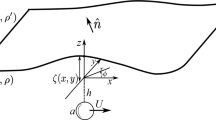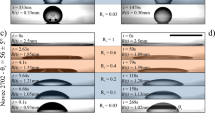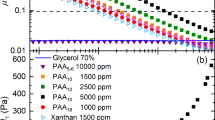Abstract
PERHAPS the greatest advantages of the surface viscosimeter which makes use of the flow of a film through a rectangular slit are (1) that the theory is relatively simple, and (2) since there are no moving parts, the substrate, usually water, is not set in motion by the apparatus, but only by the film. In a recent letter in NATURE1, Harkins and Myers show that the flux of the film through a narrow slit varies inversely as the cube (a3) of the diameter of the slit. Since this neglects the effect due to the viscosity of the substrate, η0, it seems to be essential to develop the complete theory, and this has been done by one of us (Kirkwood). For a slit of length l, depth h, and width a, the area flux A, is given by where α = (f2–f1)/l is the pressure gradient in the slit. If h/a is large relative to unity, this may be represented by a practically adequate approximation as.
This is a preview of subscription content, access via your institution
Access options
Subscribe to this journal
Receive 51 print issues and online access
$199.00 per year
only $3.90 per issue
Buy this article
- Purchase on Springer Link
- Instant access to full article PDF
Prices may be subject to local taxes which are calculated during checkout
Similar content being viewed by others
References
NATURE, 140, 465 (1937).
Author information
Authors and Affiliations
Rights and permissions
About this article
Cite this article
HARKINS, W., KIRKWOOD, J. The Surface Slit Viscosimeter and the Viscosity of Monolayers. Nature 141, 38–39 (1938). https://doi.org/10.1038/141038b0
Issue Date:
DOI: https://doi.org/10.1038/141038b0
This article is cited by
-
The theory of the measurement of surface viscosity
Kolloid-Zeitschrift & Zeitschrift für Polymere (1968)
-
La rh�ologie superficielle: un mod�le pour les processus d'�coulement des syst�mes collo�daux
Kolloid-Zeitschrift (1954)
-
Die nicht-Newtonsche Oberflächenviskosität
Kolloid-Zeitschrift (1952)
-
Die Viskosit�t monomolekularer Oberfl�chenfilme
Kolloid-Zeitschrift (1939)
Comments
By submitting a comment you agree to abide by our Terms and Community Guidelines. If you find something abusive or that does not comply with our terms or guidelines please flag it as inappropriate.



